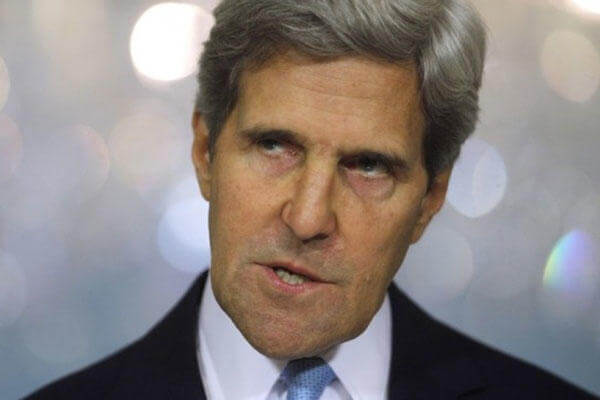Russia's plan to avert a U.S.-led military strike on Syria by placing the country's chemical weapons under international control can't be a "delaying tactic," Secretary of State John Kerry said Tuesday.
The U.S. is awaiting more details about the proposal, an idea that was quickly embraced by Russia and Syria, as well as senior lawmakers in Washington, D.C., after Kerry floated it Monday during a press conference in London.
"But we're not waiting for long," Kerry said Tuesday before members of the House Armed Services Committee on Capitol Hill. "It can't be a delaying tactic."
The only reason Russia and Syria are considering the proposal is because the U.S. is threatening to use military force, Kerry said. "Nothing focuses the mind like the prospect of a hanging," he said, paraphrasing a quote from the English writer Samuel Johnson.
Kerry testified alongside Defense Secretary Chuck Hagel and Chairman of the Joint Chiefs of Staff Army Gen. Martin Dempsey. None of the administration officials gave a timeline for the proposal to move forward, though Hagel said "it has to come rapidly."
President Barack Obama, who has repeatedly pressed for a limited air strike against Syria in response to an alleged chemical weapons attack on civilians, yesterday called the idea a "potentially positive development." He is set to address the nation Tuesday night at 9 p.m. local time from the East Room of the White House.
U.S. intelligence has determined the regime of Syrian President Bashar al-Assad killed at least 1,429 people, including at least 426 children, in an Aug. 21 gas attack in the suburbs of Damascus, according to an unclassified assessment of the incident.
A rising number of Americans oppose U.S. missile strikes against Syria, with 64 now opposed to such a move, up from 59 percent last week, according to a new Washington Post-ABC News poll.
Senate leaders have shelved a vote that was scheduled for tomorrow on whether to authorize the use of force in Syria to consider the diplomatic proposal.
When asked by congressmen if the House should also delay voting on the measure, Kerry said the administration is still seeking congressional support for a military strike in Syria.
"The use of force absolutely should not be off the table," he said. "We're not asking Congress not to vote."
Kerry argued with Rep. Jeff Miller, R-Fla., over the reasons for the Senate's decision to delay the vote. Miller said it was because the chamber's leaders didn't have enough votes to pass a resolution authorizing force.
"You know that," Miller said.
"Actually, no I don't," Kerry replied, becoming increasingly frustrated. "Do you want to play politics here or do you want to get a policy in place?" he said later. "The policy that can be put in place is to try to get this particular option of getting control of chemical weapons in place. If you want to undermine that, then play the politics."
Kerry said he was scheduled to discuss the diplomatic solution with Russian Foreign Minister Sergey Lavrov, whose office said Russia will draft a U.N. declaration to put Syria's chemical weapons under international control.
During the House hearing, several members, including the committee's chairman, Rep. Howard "Buck" McKeon, R-Calif., questioned the Defense Department's ability to pay for a military operation in Syria, given automatic budget cuts known as sequestration.
McKeon said it costs upwards of $30 million per ship to keep destroyers and other vessels near Syria, citing figures previously discussed by Chief of Naval Operations Adm. Jonathan Greenert. In an op-ed published Tuesday in The Wall Street Journal, McKeon wrote that he wouldn't support a strike against Syria unless defense funding was restored to previously budgeted levels.
Dempsey said he shares McKeon's concerns that across-the-board budget cuts threaten to harm operations and maintenance, among other military accounts, but that if an operation is deemed in the interest of the national security, "we can find the money to pay for it."
McKeon responded, "I have no question that you will find the money, general. It's just where you'll find it."
Dempsey later said any strike would be "militarily significant." The Pentagon has identified targets for initial and subsequent rounds of attacks to degrade the regime's ability to conduct similar chemical weapons attacks in the future, he said.




























